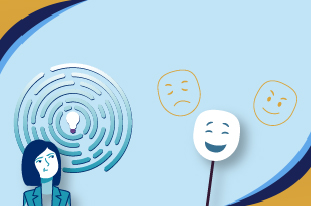Daily many people worldwide struggle with different mental health disorders. The list of these mental health disorders is long and never-ending. However, two of the most common ones are bipolar disorder and ADHD. Thus, without professional help, differentiation between the two sometimes becomes almost impossible though their symptoms may vary.
The mental health condition of the patient can significantly deteriorate if the signs of these mental health disorders are ignored for a long period. Therefore, it is always the best option to acquire professional mental health assistance promptly to prevent any negative effects of mental health disorders.
This content is beneficial for people looking to learn more about bipolar disorder vs ADHD, how to differentiate between ADHD and bipolar, and is ADHD the same as bipolar.
Understanding Bipolar Disorder
Bipolar disorder is a serious mental health disorder that revolves around two types of phases. One is the manic phase including elevated mood and the other one is depressive mood comprising extremely low mood. The involvement of rapid cycling of mood is what makes bipolar disorder difficult to manage and thus it interferes with the lives of the affected people.
Common Signs Of Bipolar
Usually, the signs of bipolar disorder depend on the phases. However, here are some of the common manic and depressive signs:
- Intense euphoria
- Hopefulness
- Sudden mood changes
- Restlessness
- Racing thoughts
- Elevated energy levels
- Reckless behavior
- Psychosis
- Pervasive sadness
- Low energy
- Fatigue
- Hopelessness
- Lack of interest in activities
- Irritability
- Sleep disturbances (insomnia or hypersomnia)
- Altered eating habits
- Suicidal ideation
- Uncontrollable crying
- Decreased motivation
Understanding ADHD
ADHD is a mental health disorder that disrupts brain functions responsible for task planning, focus, and execution. Its symptoms vary according to subtype inattentive, hyperactive, or combined with diagnosis often being more challenging in girls and adults.
Common ADHD Symptoms
The common signs of ADHD include:
- Inattention
- Diminished focus
- Impulse control issues
- Poor time management
- Hyperfocus
- Hyperactivity
- Intense emotions
- Executive dysfunction
ADHD Vs Bipolar Symptoms
These conditions bear similarities in that they cause elevated energy, speech, distractibility, and intrusive thoughts.
The critical distinctions are that in bipolar disorder, mood is affected mostly, while, in ADHD, behavior and attention are the major concerns.
The primary difference is that bipolar disorder leads to episodes of mania, hypomania, and depression. In contrast, signs of ADHD are constant and chronic.

These mental health disorders can affect any person regardless of age. However, the only difference lies in the onset of these disorders. ADHD usually appears earlier in childhood. While bipolar disorder signs manifest in late adolescence or young adulthood.
Genetic factors significantly contribute to both conditions. Sharing family history with a healthcare provider is essential for accurate diagnosis.
Key Symptom Overlaps
- Impulsivity
- Hyperactivity
- Inattention
- Physical energy
- Emotional and behavioral instability
The Prevalence Of ADHD Symptoms Vs Bipolar
Bipolar disorder and ADHD are both prevalent mental health conditions, but they differ significantly in their occurrence. ADHD (Attention-Deficit/Hyperactivity Disorder) is more common, affecting about 5-10% of children and 2-5% of adults worldwide. It often manifests early in childhood, with symptoms of inattention, hyperactivity, and impulsivity. In contrast, bipolar disorder, characterized by mood swings between depression and mania, is less common, affecting approximately 1-2% of the global population. Bipolar disorder typically appears in late adolescence or early adulthood, though it can also emerge in children. Both conditions can co-occur, complicating diagnosis and treatment, as their symptoms may overlap.
Treatment Strategies for Bipolar Disorder and ADHD
Attaining high-quality and effective mental health treatment to manage the signs of bipolar disorder and ADHD is essential. The following are some of the commonly used therapeutic approaches:
Bipolar Disorder Treatment
Mental health professionals typically prescribe psychiatric medications like mood stabilizers, including:
– Carbamazepine (Tegretol)
– Lithium (Eskalith)
– Lamotrigine (Lamictal)
– Valproate (Depakote)
– Oxcarbazepine (Trileptal)
Sometimes, a combination of mood stabilizers and antidepressants is recommended.
ADHD Treatment
The key to successful and effective mental health treatment includes psychiatric medications and behavioral therapy. Some of the commonly prescribed medications include non-stimulants, stimulants, and antidepressants such as:
- Amphetamine (Adderall)
- Guanfacine (Intuniv)
- Viloxazine (Qelbree)
- Lisdexamfetamine dimesylate (Vyvanse)
- Bupropion (Wellbutrin)
- Methylphenidate (Concerta)
Therapies For Comorbid Bipolar And ADHD
Bipolar disorder is best treated with the help of psychoeducation, cognitive-behavioral therapy, social rhythm therapy, and interpersonal therapy. Similarly, for effectively treating ADHD the most commonly adapted treatments include behavioral therapy and psychoeducation after the manifestation of the disorder.
Therapy options for bipolar and ADHD are:
Cognitive Behavioral Therapy:
ADHD patients, in particular, can experience a lot of benefits from CBT and so can patients with bipolar disorder. CBT has its main function of identifying negative thoughts with positive ones with the assistance of different coping techniques. Additionally, it can help the affected people develop effective strategies for overcoming signs of both mental health disorders. The plus point of this therapy is that it helps the patients by enhancing mood stability and also improves overall functioning.
Family Therapy:
Family therapy serves as a valuable therapy in supporting individuals with Bipolar and ADHD. Even a slight involvement of the family members can provide mental and physical support to the affected people. This will aid in promoting effective communication, problem-solving, and lastly healthy coping strategies.
Psychoeducation:
Psychoeducation can accordingly be defined as attempting to provide the patient, especially the family with all the needful information on mental health disorders. Based on the above points, the following will be beneficial to the patients as they will learn about the signs and the effect they have on functioning. Furthermore, psychoeducation seeks to help the affected individuals feel encouraged since they know the details of the mental health disorder that they are going through.
Interpersonal And social Rhythm Therapy:
ISPRT is a mental health treatment that is beneficial for people with bipolar and ADHD. The main goal of ISPRT is to stabilize the patients’ daily routines and manage interpersonal relations to help the patients manage their mood signs and increase their overall functioning.
Conclusion!
Bipolar disorder and ADHD are two severe mental health problems that have affected the lives of many people. Both these mental health disorders are characterized by particular signs and are sometimes mixed due to several signs such as elevated energy, speech, distractibility, and intrusive thoughts. The primary difference lies in the areas these mental health disorders affect. Bipolar disorder majorly affects your mood while ADHD severely affects a person’s behavior and attention. The best therapeutic approaches to manage the signs of both these mental health disorders include psychoeducation, psychiatric medications, and some behavioral therapies. So, if you or your loved ones are suffering from any of these mental health disorders then now is the perfect time for you to get in touch with Orange Coast Psychiatry and defeat the rigid signs of bipolar disorder and ADHD today!


















